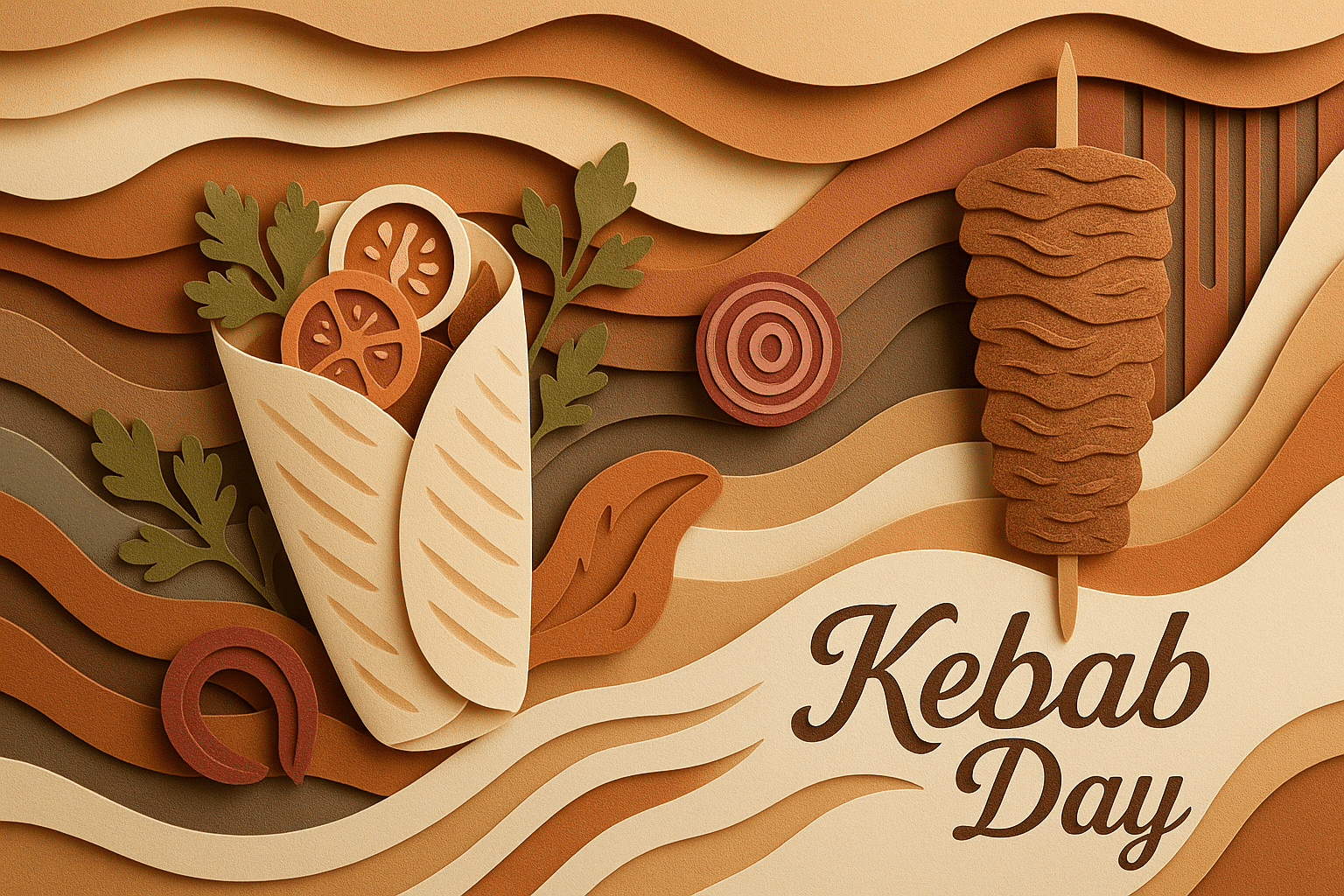What is World Kebab Day?
World Kebab Day is celebrated each year on the second Friday of July. This day honours the rich and diverse tradition of kebabs across cultures. Whether grilled on skewers, roasted in a tandoor or cooked over open flames, kebabs are a staple of global street food and fine dining alike. The celebration encourages people to enjoy kebabs in all their forms and explore their cultural roots.
Kebabs are more than just meat on a stick. They represent centuries of culinary history, from ancient Persian and Turkish recipes to South Asian, Mediterranean and modern fusion styles. World Kebab Day is about flavour, community and tradition. Many restaurants offer specials, while food lovers around the world come together to grill, share and celebrate this beloved dish.
History and Origin
The word “kebab” is believed to come from the Persian word “kabab,” meaning to fry or to burn. The practice of skewering and grilling meat dates back to ancient times, particularly in the Middle East and Central Asia. Over the centuries, the method travelled and evolved through the Ottoman Empire and into regions like North Africa, India and Europe. Every culture that adopted kebabs gave them a distinct twist, using local spices, meats and cooking styles.
World Kebab Day began as an informal celebration among food lovers and slowly grew into a global food holiday. Its timing in mid-summer makes it perfect for outdoor barbecues and gatherings. While the exact origins of the day are unclear, its spirit is universal. It celebrates cultural diversity through food and encourages people to try new flavours. From traditional recipes to modern takes, kebabs remain a symbol of shared meals and culinary creativity.
Who participates in World Kebab Day?
- Food enthusiasts: enjoy classic or creative kebab dishes around the world
- Restaurants and street vendors: offer special menus and kebab deals
- Home cooks: prepare family recipes or experiment with new spice blends
- Cultural centres and communities: host tastings, markets or cooking demos
- Social media users: post photos, recipes and food reviews celebrating kebabs
Slogans and Themes
World Kebab Day celebrates global food culture, grilling traditions and community gatherings. Popular slogans include “Grill and chill,” “Kebab lovers unite,” and “One skewer, many stories.” Themes often focus on tradition, innovation and flavour. The day highlights how a simple cooking method connects people from many regions and backgrounds.
Colors, Symbols and Patterns
Colors
- Red: represents spice, fire and bold flavour
- Brown: reflects grilled meat and earthiness
- Green: symbolises fresh herbs and cultural freshness
Symbols
- Skewers: represent the universal form of kebabs
- Grills: symbolise shared meals and summer cooking
- Spice jars: highlight the diverse flavours in kebab recipes
Patterns
- Flame motifs: suggest the grilling process and warmth
- Herb patterns: reflect traditional garnishes and fresh ingredients
- Geometric borders: draw from Middle Eastern and South Asian design
Most used hashtags
- #worldkebabday
- #kebabtime
- #grillandchill
- #meatonaskewer
- #kebablover
How do you celebrate World Kebab Day?
- Visit a kebab restaurant: try regional varieties or fusion versions
- Fire up the grill: make your own kebabs at home with friends and family
- Explore international styles: taste Turkish, Persian, Indian or Greek kebabs
- Join a food festival: attend local events focused on grilled foods
- Share your kebab story: post recipes or food memories on social media
Why is World Kebab Day important?
World Kebab Day is important because it brings people together through food. It celebrates culinary diversity and encourages people to try something new. From a street-side vendor in Istanbul to a family barbecue in New York, kebabs tell stories of migration, memory and flavour. The day invites people to appreciate the shared human love for food prepared with care and fire.
It also honours tradition while leaving room for creativity. Whether vegan, lamb, chicken or seafood, kebabs can adapt to every taste and diet. By recognising the global popularity of kebabs, this day creates space for cultural exchange and celebration. It is a joyful reminder that something as simple as grilled food can build bridges across continents.
Features
Second Friday of July: Kebab Day
Articles
- Africa: The Second Largest Continent with Diverse Cultures and Economies
- Sociocultural Theory: An Overview of Vygotsky's Concepts and Applications
- Understanding the All-or-None Law in Nerve and Muscle Function
- Helium: A Colorless Gas and Chemical Element with Atomic Number 2
- Understanding Heat Transfer in Thermal Engineering Systems
- Quotes to Help You Heal from Heartbreak
Days
- Second Wednesday of January: Take the Stairs Day (United States)
- Second monday of January: Birthday of Eugenio María de Hostos (Puerto Rico)
- Second Monday of January: Gluten-Free Day
- Second Monday of January: Seijin no Hi (Coming of Age Day Japan)
- Second Monday of January: Clean Off Your Desk Day
- February 2: Battle of Mysunde Day (Denmark)
Why do you keep falling for the same type?
Read the article Lovemaps: the hidden blueprint of our love.
Did you not find what you were looking for? Let me help you find more.

